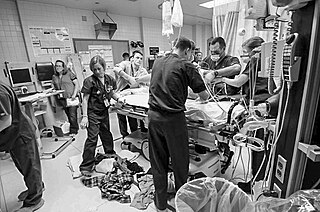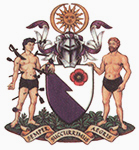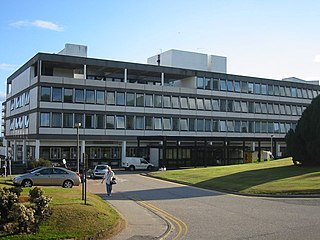Related Research Articles

Emergency medicine is the medical speciality concerned with the care of illnesses or injuries requiring immediate medical attention. Emergency physicians specialize in providing care for unscheduled and undifferentiated patients of all ages. As first-line providers, in coordination with emergency medical services, they are primarily responsible for initiating resuscitation and stabilization and performing the initial investigations and interventions necessary to diagnose and treat illnesses or injuries in the acute phase. Emergency medical physicians generally practice in hospital emergency departments, pre-hospital settings via emergency medical services, and intensive care units. Still, they may also work in primary care settings such as urgent care clinics.
In the medical profession, a general practitioner (GP) or family physician is a physician who treats acute and chronic illnesses and provides preventive care and health education to patients of all ages. GPs' duties are not confined to specific fields of medicine, and they have particular skills in treating people with multiple health issues. They are trained to treat patients to levels of complexity that vary between countries. The term "primary care physician" is more usually used in the US. In Asian countries like India, this term has been replaced mainly by Medical Officers, Registered Medical Practitioner etc.

The Royal College of Physicians of London, commonly referred to simply as the Royal College of Physicians (RCP) is a British professional membership body dedicated to improving the practice of medicine, chiefly through the accreditation of physicians by examination, and now also Physicians Assistants without examination. Founded by royal charter from King Henry VIII in 1518, as the College of Physicians, the RCP is the oldest medical college in England.
A Physician Assistant or Physician Associate (PA) is a type of healthcare professional. While these job titles are used internationally, there is significant variation in training and scope of practice from country to country, and sometimes between smaller jurisdictions such as states or provinces. Depending on location, PAs practice semi-autonomously under the supervision of a physician, or autonomously perform a subset of medical services classically provided by physicians.

Family medicine is a medical specialty within primary care that provides continuing and comprehensive health care for the individual and family across all ages, genders, diseases, and parts of the body. The specialist, who is usually a primary care physician, is named a family physician. It is often referred to as general practice and a practitioner as a general practitioner. Historically, their role was once performed by any doctor with qualifications from a medical school and who works in the community. However, since the 1950s, family medicine / general practice has become a specialty in its own right, with specific training requirements tailored to each country. The names of the specialty emphasize its holistic nature and/or its roots in the family. It is based on knowledge of the patient in the context of the family and the community, focusing on disease prevention and health promotion. According to the World Organization of Family Doctors (WONCA), the aim of family medicine is "promoting personal, comprehensive and continuing care for the individual in the context of the family and the community". The issues of values underlying this practice are usually known as primary care ethics.
In the United Kingdom, junior doctors are qualified medical practitioners working whilst engaged in postgraduate training. The period of being a junior doctor starts when they qualify as a medical practitioner following graduation with a Bachelor of Medicine, Bachelor of Surgery degree and start the UK Foundation Programme. It culminates in a post as a consultant, a general practitioner (GP), or some other non-training post, such as a specialty doctor or associate specialist post.

The Royal College of Emergency Medicine (RCEM) is an independent professional association of emergency physicians in the United Kingdom which sets standards of training and administers examinations for emergency medicine. The patron is The Princess Royal.

The Royal College of General Practitioners (RCGP) is the professional body for general (medical) practitioners in the United Kingdom. The RCGP represents and supports GPs on key issues including licensing, education, training, research and clinical standards. It is the largest of the medical royal colleges, with over 54,000 members. The RCGP was founded in 1952 in London, England and is a registered charity. Its motto is Cum Scientia Caritas – "Compassion [empowered] with Knowledge."

The Royal Infirmary of Edinburgh (RIE), often known as the Edinburgh Royal Infirmary (ERI), was established in 1729 and is the oldest voluntary hospital in Scotland. The new buildings of 1879 were claimed to be the largest voluntary hospital in the United Kingdom, and later on, the Empire. The hospital moved to a new 900 bed site in 2003 in Little France. It is the site of clinical medicine teaching as well as a teaching hospital for the University of Edinburgh Medical School. In 1960, the first successful kidney transplant performed in the UK was at this hospital. In 1964, the world's first coronary care unit was established at the hospital. It is the only site for liver, pancreas and pancreatic islet cell transplantation and one of two sites for kidney transplantation in Scotland. In 2012, the Emergency Department had 113,000 patient attendances, the highest number in Scotland. It is managed by NHS Lothian.

NHS Scotland, sometimes styled NHSScotland, is the publicly funded healthcare system in Scotland and one of the four systems that make up the National Health Service in the United Kingdom. It operates 14 territorial NHS boards across Scotland, supported by seven special non-geographic health boards, and Public Health Scotland.

Aberdeen Royal Infirmary is the largest hospital in the Grampian area, located on the Foresterhill site in Aberdeen, Scotland. ARI is a teaching hospital with around 900 inpatient beds, offering tertiary care for a population of over 600,000 across the north of Scotland. It offers all medical specialities with the exception of heart and liver transplants. It is managed by NHS Grampian.

Ara Warkes Darzi, Baron Darzi of Denham, is an Armenian-British surgeon, academic, and politician.
NHS Lanarkshire is responsible for the health care of more than 652,000 people living within the council areas of North Lanarkshire and South Lanarkshire in Scotland, making it the third largest health board in the country after NHS Greater Glasgow & Clyde and NHS Lothian. NHS Lanarkshire employs approximately 12,000 staff. The board is based at Kirklands, Fallside Road in Bothwell, South Lanarkshire.

NHS Lothian is one of the 14 regions of NHS Scotland. It provides healthcare services in the City of Edinburgh, East Lothian, Midlothian and West Lothian council areas. Its headquarters are at Waverley Gate, Edinburgh
Healthcare in England is mainly provided by the National Health Service (NHS), a public body that provides healthcare to all permanent residents in England, that is free at the point of use. The body is one of four forming the UK National Health Service as health is a devolved matter; there are differences with the provisions for healthcare elsewhere in the United Kingdom, and in England it is overseen by NHS England. Though the public system dominates healthcare provision in England, private health care and a wide variety of alternative and complementary treatments are available for those willing and able to pay.

Sir Liam Joseph Donaldson is a British doctor. He was formerly the Chief Medical Officer for England, being the 15th occupant of the post since it was established in 1855. As such, he was principal advisor to the United Kingdom Government on health matters and one of the most senior officials in the National Health Service (NHS).

The Academy of Medical Royal Colleges (AoMRC) is the coordinating body for the United Kingdom and Ireland's 24 Medical Royal Colleges and Faculties. It ensures that patients are safely and properly cared for by setting standards for the way doctors are educated, trained and monitored throughout their careers. The Academy Council meet regularly to agree direction. The Council comprises the Presidents of the member Colleges and Faculties and four coopted council members.
The Faculty of Pharmaceutical Medicine (FPM) is a faculty of the three Royal Colleges of Physicians of the United Kingdom. It is a UK-based professional membership organisation with 1,600 members; physicians with a professional interest in the speciality of pharmaceutical medicine, the science of discovering, developing and testing new drugs, their regulation, and monitoring them for safety both during development and when they are prescribed. FPM is a registered charity and ultimately exists to bring about an improvement in health in patients and the general population.
Sir John Graham Temple is a British surgeon, a former President of the Royal College of Surgeons of Edinburgh.

The British Association for Immediate Care Scotland is an organisation involved with prehospital care. It has the aims of providing encouragement and aid with the formation of immediate care schemes and to provide training to support those working in prehospital care. It shares its origins with the British Association for Immediate Care (BASICS), which has UK wide coverage. In 1993, the British Association for Immediate Care began running prehospital care courses in Scotland, which were met with a warm welcome and it became clear there was a large audience for such education, especially in remote and rural areas of Scotland. This need for training and organisational leadership became clearer after the 1994 Scotland RAF Chinook crash on the Mull of Kintyre. This led to the training provided by BASICS to be modified for a more rural setting, and to the development of BASICS Scotland as a separate organisation in 2002.
References
- ↑ "NHS accused of 'systemic failings'". Edinburgh News. 10 July 2015. Retrieved 12 July 2015.
- ↑ "Report warns patients put at risk by failings in NHS". Herald Scotland. 10 July 2015. Retrieved 12 July 2015.